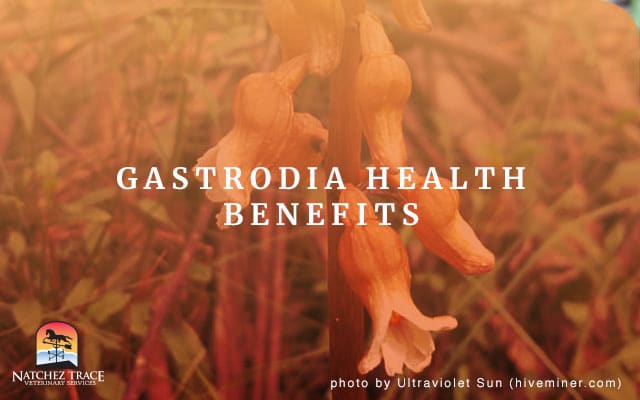Gastrodia health benefits include:
- Seizure control
- Migraine relief
- Motor function improvement after a stroke
- And much more
Many of the TCVM herbal formulas Dr. Smith recommends contain Gastrodia as one of the main ingredients.
So, we thought you might be interested in Gastrodia’s history, use, and benefits.
Gastrodia Settle Seizures Blend
One of the TCVM Gastrodia blends used in our clinic is Gastrodia Settle Seizures.
Gastrodia Settle Seizures is an ancient herbal blend that is used to exhaust external wind and settle seizures.
The herbs in Gastrodia Settle Seizures are:
- Gastrodia (tian ma) – Main Ingredient
- Loranthus (sang ji sheng)
- Abalone Shell (shi jue ming)
- Uncaria (gou teng)
- Poria (fu shen)
- Leonurus (yi mu cao)
- Cyathulae (chuan niu xi)
- Eucommia Bark (du zhong)
- Polygonum (ye jiao teng)
- Gardenia (zhi zi)
- Scutellaria (huang qin)
The herbs all work synergistically to help settle the body’s internal wind and control the seizures.
Western Vs. Eastern Viewpoints on Seizures
The medical community defines seizures as massive, uncontrolled, random firings of neurons within the brain.
The cause of seizures is often unknown in Western veterinary medicine.
Chinese veterinary medicine considers seizures to be a severe version of internal wind–an internal tornado.
In the natural world, this most extreme version of excessive wind occurs when a hot air front meets a cold air front or vice versa.
The nature of the body is similar.
Seizures occur after situations that cause extreme heat such as vaccines, toxins, anesthesia, extreme stress or extreme frustration.
This heat inside the body is caused by the liver yang rising upward.
Gastrodia is the main ingredient in Gastrodia Settle Seizures.
More on Gastrodia
Studies show Gastrodia increases the firing of threshold neurons.
And, by doing so, it decreases the uncontrolled random firing of neurons within the brain.
In other words, gastrodia reduces the number of seizures and lessens their severity.
The herbal preparation comes from the rhizome or tuber of the plant.
Gastrodia History
Gastrodia is originally from the far east in areas of China, Japan, Korea, and Tibet.
It is one of the oldest herbs in Chinese medicine, but not very well known to Western herbalists.
Gastrodia is first mentioned in the Shennong Bencao Jing, which was compiled around a.d. 100. A later Chinese herbalist named Tao Hong placed gastrodia in the category of superior herbs, which meant that it could be taken for long periods of time, and that it could be used to promote longevity as well as to treat illnesses.
It was originally called chiqian, which means “red arrow” in Chinese, because its stem is red and arrow-shaped. Later it was named tian ma, or “heavenly hemp,” which is the name that it still bears in Chinese herbal formularies. Like other wild orchids, Gastrodia elata has been placed on the list of endangered species.
The increasing difficulty of finding wild gastrodia in the 1970s led to an interesting discovery about this plant.
Chinese herbalists tried to cultivate gastrodia, but failed until biologists discovered that the plant needs two fungi in order to survive and reproduce.
It needs the Armillaria mellea mushroom on its tuber in order to grow and mature; and it requires a second fungus called Mycena osmundicola to help its seeds to sprout.
After this complicated relationship was understood, herbalists were able to grow gastrodia. -NaturalsPedia.com
Gastrodia in Nature
The gastrodia plant is very interesting and unusual in the fact that it depends on fungi for survival.
For the gastrodia plant to grow, the tuber must have the Armillaria mellea mushroom myelia mixed in with it.
Afterward, seed sprouting requires another fungus, Mycenia osmundicola.
Interestingly, scientific studies show the medicinal benefits of gastrodia are actually in the metabolites of the Armillaria mushroom, rather than the gastrodia plant itself.
This means that if the mushroom could be grown on its own, we would not need the gastrodia tuber.
Gastrodia Health Benefits in Traditional Chinese Medicine
Traditional Chinese Medicine considers Gastrodia Root (tian ma) to be neutral and sweet and affects the liver meridian.
This herb calms the liver and extinguishses liver wind from either cold or heat patterns.
In TCM, liver wind causes
- Temors
- Headache
- Spasms
- Epilepsy
- Convulsions
Gastrodia Root (tian ma) also helps problems caused by heat or blood deficiency.
By extinguishing wind, Gastrodia helps alleviate migraines. It does so by reducing the migraine headache pain and dizziness associated with wind-phlegm patterns.
Gastrodia herb also helps relieve wind-phlegm-caused numbness and pain in the lower back and extremities.
In addition, Traditional Chinese herbalists use gastrodia to treat:
- Numbness of the limbs
- Rheumatism
- Arthritis
- Sciatica
- Stroke induced motor impairment
Gastrodia Health Benefits in Western Herbal Medicine
Historically, Western herbalists have not often used gastrodia.
However, recently manufacturers started extracting the active ingredient from the gastrodia tuber to make vanillin tablets.
Vanillin tablets treat grand mal seizures and petit mal attacks of epilepsy.
Gastrodia Contraindications and Signs of Overdosage
Gastrodia has not been used by Western herbalists, so there are no studies of its interactions with Western pharmaceuticals.
Do not give gastrodia to pregnant females. Signs of overdosage include skin allergies, hair loss, and other similar allergic reactions
Sources:
- Herbsmith Rx
- MDidia Herbal Extracts
- NaturalsPedia.com
- Sacred Lotus Arts Traditional Chinese Medicine
- TCM China
- Yin Yang House
Note: It is always best to consult with your veterinarian before concluding that your pet has a particular ailment. Your veterinarian will also recommend the best dosage of a particular remedy for your pet based on its symptoms, age, size, and specific needs.








